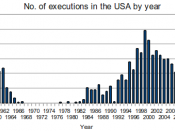Also known as, Capital Punishment, the death penalty is the most severe form of corporal punishment, as it requires law enforcement to kill the offender. Forms of the death penalty include hanging, gassing, firing squad, electrocution, and lethal injection. This paper will look at the death penalty as it applies to cost, deterrence, and the innocence of the accused. It will discuss these issues as it applies to the overall benefit of abolishing the death penalty all together.
One of the main benefits of abolishing the death penalty is the immediate financial gain each state receives. In 1988, Dr. Harold G Grasmick and Dr. Robert Bursik, Jr. found that the general support for the death penalty dropped from over 80.2% to 64.6% if the cost of the death penalty was more than the cost of life imprisonment. Life imprisonment is far from cheap; but the cost is much less than the death penalty.
In a report from the US Judicial Conference, it was reported that in cases where the death penalty was pursued costs were 4 times higher than cases where it was not. In cases involving the death penalty the state prosecutors' costs were 67% higher than the defense costs. This is not including costs incurred by law enforcement for investigative purposes. On average, the trials for death cases cost about $508,000 while the trials for non-death cases cost $32,000. Based on statistics from the US Department of Justice, as of 2001 there were 3,557 people in prison under the sentence of death. These trials cost an estimated $1,806,956,000. With the abolition of capital punishment, this number would be reduced to approximately $113,824,000 a savings of $1,693,132,000. This money could be used to improve social conditions that would potentially decrease crime in the inner cities.
Supporters of capital...



Death panelty
great essay focusing and arguing of the abolishment of the death penelty that still exists in many parts of the world.
4 out of 4 people found this comment useful.